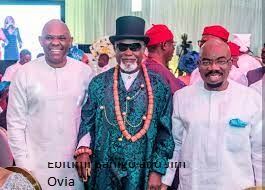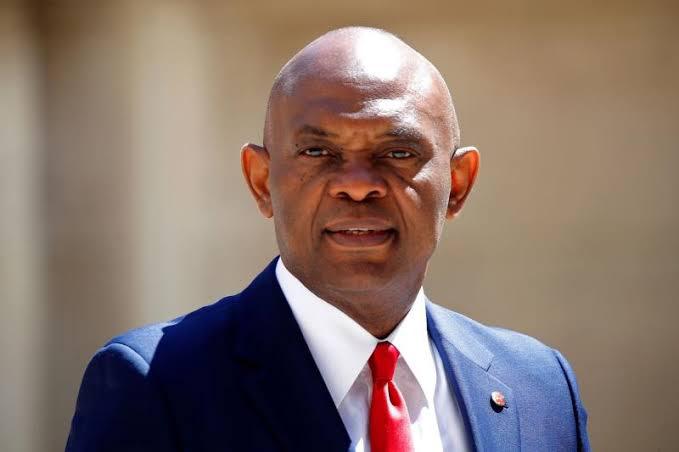What I Do Whenever I Face Crises
OpenLife Nigeria reports that in these challenging times for public office leaders and technocrats in the corporate circle, Anthony Onyemaechi Elumelu, popularly known as Tony Elumelu, has offered tips that would assist those encountering challenges.
According to the Nigerian economist, philanthropist and chairman Heirs Holdings, UBA and Transcorp group, “Leadership has many components. ”
He unveils his days of little beginning, in a rare narrative on his Facebook wall. The Delta State billionaire pointed out that he learned so much from Ebitimi Banigo, a Nigerian banker who was chief executive of International Merchant Bank of Nigeria Minister of Science and Technology in Nigeria.
Elumelu advises people in business and politics to pick one or two lessons from his personal experience to drive their vision. His thoughts are reproduced below unedited
People often ask me, TOE how do I learn leadership. Should I go on a course? Buy a book? Get a mentor? Are leaders born, or can you become a leader?
Just as I say about business success, leadership has many components – luck and being in the right place at the right time. But I also believe that those talents and those disciplines that you bring, creating a vision and the resilience and focus that delivers that vision, can also forge your own personal leadership.
I was fortunate to work with Chief Ebitimi Banigo, at the start of my career. My leadership philosophy was built working with him. It started with Chief Banigo taking the time to read my application letter and giving me a chance to prove myself at Allstates Trust Bank in 1988.
When my colleagues tell me today, “TOE you respond too fast to our emails”, I laugh because I learnt from the master himself – Chief Banigo. When I sent memos to him, he would respond within twenty-four hours; therefore, why should I not respond even faster in this age of technology?
These are some of the leadership values I learned from my time with Chief Banigo, and I practise them all today.
1. Leaders must demand excellence: Only by going the extra mile and pushing ourselves, will we truly develop and stand out. Hard work and excellence made my bosses Toyin Akin-Johnson and Ebitimi Banigo notice, and subsequently, believe in me.
At twenty-seven, I went from being a trainee to being a boss, when I was appointed a branch manager – the youngest bank branch manager at that time. All the things I learned earlier came into play, and I continued learning.
2. Good leaders find in people, what people did not know they possess – Leaders recognise the talent in their team and then push to unlock the talent. When I work, I work to achieve my goals, but I also work to unlock my team’s skills.
This focus on talent, teams, personal transformation, is why I am so insistent on creating institutions, cultures, and pathways, where human capital can thrive. It is why I am an investor in businesses, but also entrepreneurs across Africa.
3. Leaders must walk their talk – A leader must be consistent. People want to trust a leader that they believe has integrity. Leadership is not just about telling people what to do, it’s also about setting an example. A good leader must lead by example and practice what they preach, this demonstrates integrity, it builds trust and respect.
4. Leaders must impart knowledge: I benefitted from the mentorship of Chief Banigo at Allstates Trust Bank.
He helped me to develop my strategic thinking, my frames of reference and to channel my ideas into concrete actions, so that when the moment of opportunity arrived, at the age of thirty-four, I had the self-belief to gather a small group together to take over and revive a failing bank – take that enormous step, that is still shaping an industry and a continent today.
Today, when I am faced with an impossible situation, I ask myself, ‘What Would Chief Banigo Do?’. I worked with Chief Banigo from 1988 – 1995, till this day, he is the one I turn to when I need advice.
Profile of Ebitimi Banigo, Tony Elumelu’s mentor
Ebitimi Banigo is a Nigerian banker who was chief executive of International Merchant Bank of Nigeria from 1981 to 1986.
Between 1999 and 2000, he was Minister of Science and Technology in Nigeria.
Banigo briefly worked for the accounting firm of Peat Marwick, Cassleton Elliott & Company before traveling abroad to earn an undergraduate degree in economics from University at Buffalo.
He later earned an MBA from Harvard University. Between 1976 and 1978 and worked with Citicorp in New York working on international loan syndication and services.
In 1979, he moved across the Atlantic and joined Chase Merchant Bank working from its London office. Chase has an affiliate in Nigeria that later became Continental Merchant Bank. Banigo was transferred to the Nigerian affiliate in 1980.
Upon his return to Nigeria, he briefly worked with the local branch of Chase Merchant Bank as the corporate finance manager.
In 1980, he left Chase to become deputy managing director of International Merchant Bank and in 1981, he became the banks’s MD. Banigo was at the helm of IMB for five years.
In 1988, Banigo and a group of investors started Allstates Trust Bank.
In the 2000s, the bank’s license was suspended and Banigo was detained by the Economic and Financial Crimes Commission on the recommendation of the Central Bank.
The apex bank audited the bank’s financial records and alleged Banigo and his associated companies were extended loan facilities amounting to more than 35% of shareholder equity, a violation of the Bank and Other Financial Institutions Act (BOFIA) of 1991.
In 2012, he became the Amanyanabo of Okpoama Kingdom, a traditional title making him King of Okpoama kingdom of Brass Local Government.







